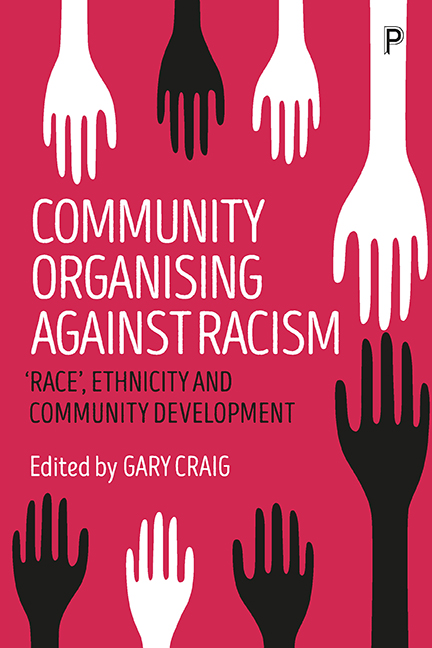Book contents
- Frontmatter
- Dedication
- Contents
- List of figures
- Author biographies
- List of abbreviations
- Introduction
- Section One Community development with ethnic minorities: history, theory, policy
- Section Two Building capacity with BME groups
- Section Three Working with Roma communities
- Section Four Global experience
- Section Five Working across cultural boundaries: ideological and personal reflections
- Afterword: Messages for community development in working with minority groups
- Index
Thirteen - Benarrawa Aboriginal and Torres Strait Islander Solidarity Group: working to reduce the deleterious effects of racism through structural community development
Published online by Cambridge University Press: 12 April 2022
- Frontmatter
- Dedication
- Contents
- List of figures
- Author biographies
- List of abbreviations
- Introduction
- Section One Community development with ethnic minorities: history, theory, policy
- Section Two Building capacity with BME groups
- Section Three Working with Roma communities
- Section Four Global experience
- Section Five Working across cultural boundaries: ideological and personal reflections
- Afterword: Messages for community development in working with minority groups
- Index
Summary
Introduction
In the late 1990s members of the Benarrawa Solidarity Group in Brisbane, Australia came together to explore issues of racism and learn more about Aboriginal and Torres Strait Islander (ATSI) histories and culture. The Solidarity Group, comprising Indigenous and non- Indigenous community members, has demonstrated a long-term commitment to community development actions to promote justice and understanding between all people. The multifaceted nature of their relationships and work significantly contributed to one of the author's research studies and to theorising about structural community development (SCD) (Lathouras, 2012a; 2013). SCD is a bottomup, citizen-led and -owned approach that seeks to challenge racism at its source in systems, laws and policies based on white privilege (Pease, 2010). This chapter seeks to acknowledge the path-breaking community development work of the Benarrawa Solidarity Group by providing an account of how many aspects of its initiatives can be understood as SCD. In this way academic theorising is deeply informed by bottom-up community activism (Lathouras, 2016) where there is a mutual learning and sharing from the exchanges that form the basis of the ideas presented here.
There is a pressing need to retheorise community development, to strengthen its ability to address racism caused by structural disadvantage. This structural disadvantage takes the form of the undermining longterm effects of colonisation and neoliberalism that have resulted in intergenerational oppression for many of Australia's First Peoples (Hollinsworth, 2006). Government interventions in Indigenous communities, often employing top-down, service-oriented strategies, have compounded the institutional bases of racism in Australia (Cox, 2014).
The theorising related to SCD will show how Benarrawa's work over time can be seen as a form of politically aware practice aimed at reducing the deleterious effects of racism in two ways. First, racism is challenged through the adoption of a multifaceted structural analysis of the root causes of oppression that seeks to address the issues at their source. Second, racism is shown to be challenged by the adoption of a three-fold practice framework focuses relationship building linked to a power analysis and collective action beyond the purely local geographical level. The structural analysis ‘frames’ the practice framework such that both are crucial to effecting structural change.
The Australian racial context
The Indigenous people of Australia are members of the oldest continuous culture in the world, historically comprising around 600 cultural groups and languages.
- Type
- Chapter
- Information
- Community Organising against Racism'Race', Ethnicity and Community Development, pp. 215 - 230Publisher: Bristol University PressPrint publication year: 2017

